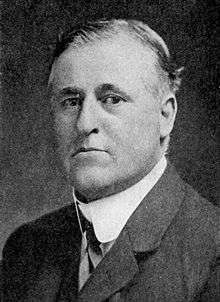William Watson (poet)
| Sir William Watson | |
|---|---|
 Photo by Elliott & Fry, Ltd. | |
| Born |
2 August 1858 Burley-in-Wharfedale, Yorkshire |
| Died |
13 August 1935 (aged 77) Rottingdean, Sussex |
| Signature | |
|
| |
Sir William Watson (2 August 1858 – 13 August 1935) was an English poet, popular in his time for the celebratory content, and famous for the controversial political content, of his verse. Initially popularly recognised, he was then neglected because of changing tastes.
Poet
Watson was born in Burley, in present-day West Yorkshire. He was a prolific poet of the 1890s, and a contributor to The Yellow Book, though without "decadent" associations, and on the traditionalist wing of English poetry. His reputation was established in 1891, with the publication of "Wordsworth's Grave". On Alfred Tennyson's death in 1892, he was a strong candidate to be his eulogist, the commission resulting in his "Lachrymae Musarum". He suffered a breakdown later in 1892 and was passed over for the position of Poet Laureate in favour of Alfred Austin.
Watson regained his standing in 1894 with the publication of Odes and other poems, which included "Vita Nuova", expressing gratitude for his recovery. He courted controversy later in the decade with a attack on Turkey (The Purple East, 1896) and then later again with anti-Boer War poems. After Austin's death in 1913, Prime Minister Asquith considered him for the laureateship, despite the fact that he had written a cruel pasquil against his wife Margot Asquith ('She is not old, she is not young/ The woman with the serpent's tongue'); but because of the contentious nature of his political poems, he was again passed over, this time for Robert Bridges. Perhaps in exchange for writing a panegyric of Lloyd George, or perhaps because of his support of the Great War effort, he was awarded a knighthood in 1917.
After World War I Watson was largely forgotten. A number of literary men in 1935 issued a public appeal for a fund to support him in his old age; he died the same year.
Family
Watson married Adeline Maureen Pring in 1909; they had two daughters.[1]
Works
- The Prince's Quest and Other Poems (1880)
- Epigrams of Art, Life and Nature (1884)
- Wordsworth’s Grave and Other Poems (1890)
- Poems (1892)
- Lachrymae Musarum (1892)
- Lyric Love: An Anthology (1892)
- Eloping Angels : A Caprice (1893)
- The Poems of William Watson (1893)
- Excursions in Criticism: Being Some Prose Recreations Of A Rhymer (1893)
- Odes and Other Poems (1894)
- The Father of the Forest & Other Poems (1895)
- The Purple East: A Series Of Sonnets On England's Desertion of Armenia (1896)
- The Year of Shame (1897)
- The Hope of the World and Other Poems (1898)
- The Collected Poems of William Watson (1899)
- Ode on the Coronation of King Edward VII (1902)
- Selected Poems (1903)
- For England. Poems Written During Estrangement (1904)
- New Poems (1909)
- Sable and Purple (1910)
- The Heralds of the Dawn: A Play in Eight Scenes (1912)
- The Muse in Exile (1913)
- Pencraft. A Plea For The Older Ways (1916)
- The Man Who Saw: and Other Poems Arising out of the War (1917)
- Retrogression and Other Poems (1917)
- The Superhuman Antagonists and Other Poems (1919)
- "Ireland Unfreed. Poems and Verses written in the early months of 1921" (1921)
References
- Jean Moorcroft Wilson (1981) I Was an English Poet: a Critical Biography of Sir William Watson 1858–1936
- Kunitz, Stanley J and Howard Haycraft, Twentieth Century Authors. H. W. Wilson, 1942.
Notes
- ↑ Nelson, James G. "Watson, William". Oxford Dictionary of National Biography (online ed.). Oxford University Press. doi:10.1093/ref:odnb/36774. (Subscription or UK public library membership required.)
External links
| Wikisource has original works written by or about: William Watson |
| Wikiquote has quotations related to: William Watson (poet) |
| Wikimedia Commons has media related to William Watson (poet). |
- Works by William Watson at Project Gutenberg
- Works by or about William Watson at Internet Archive
- Works by William Watson at LibriVox (public domain audiobooks)

|